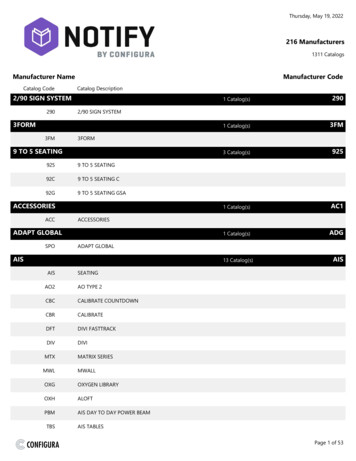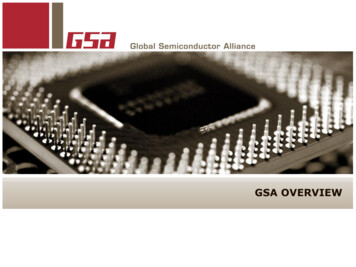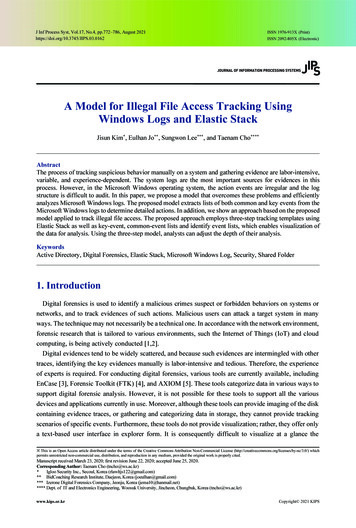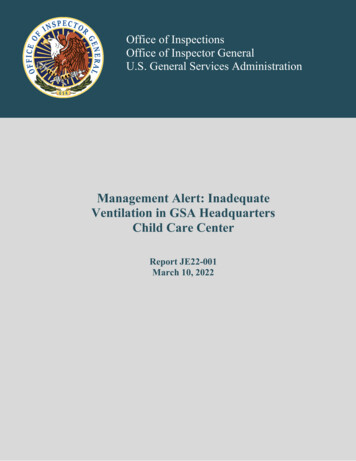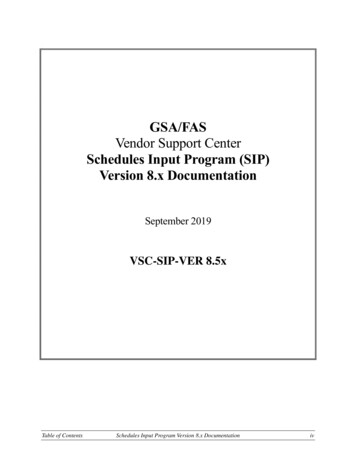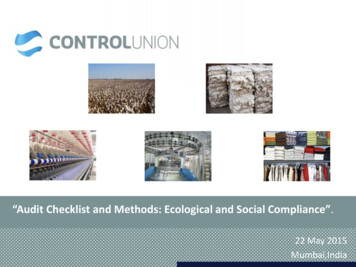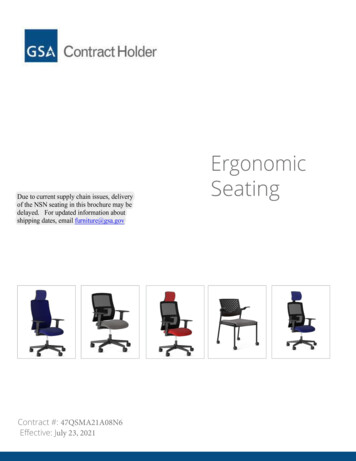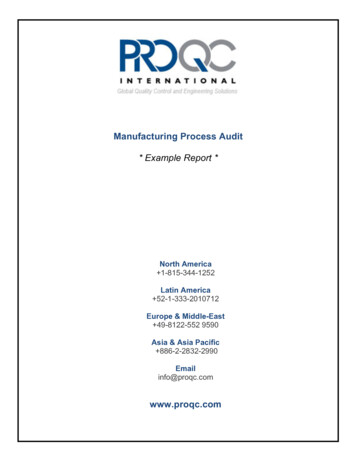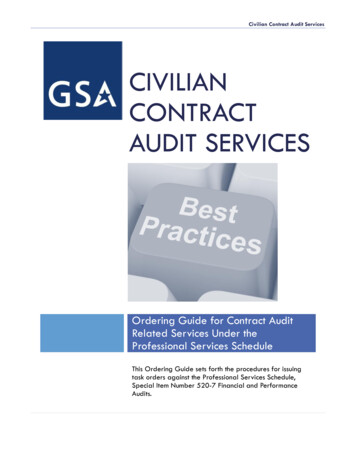
Transcription
Civilian Contract Audit ServicesCIVILIANCONTRACTAUDIT SERVICESOrdering Guide for Contract AuditRelated Services Under theProfessional Services ScheduleThis Ordering Guide sets forth the procedures for issuingtask orders against the Professional Services Schedule,Special Item Number 520-7 Financial and PerformanceAudits.
Civilian Contract Audit ServicesTable of ContentsINTRODUCTION. 3SCOPE OF THE ORDERING GUIDE . 3WHO IS THIS GUIDE WRITTEN FOR? . 3THE EMERGING NEED . 4HOW THIS DOCUMENT IS ORGANIZED . 4SECTION 1. CONTRACT AUDIT SERVICES – UNIQUE CHARACTERISTICS . 5Areas and Types of Contract Audit Services . 5Contract Audit Services throughout the Procurement Lifecycle . 5Qualified Private Auditor . 6Inherently Governmental Functions. 6Cognizance and Coordination . 7SECTION 2. PROCUREMENT BEST PRACTICES. 8Align Mission Requirements . 8Determine Accurate Estimates . 8Select Pricing Architecture. 8Develop Requirements . 9Selection Methodology/Criteria . 11IN DETERMINING THE PROCUREMENT METHOD, IT IS HIGHLY RECOMMENDED THAT ORDERINGAGENCIES CONSIDER AND UTILIZE THE BEST VALUE PROCUREMENT METHOD AS STATED IN FAR PART8.404(D) AND 8.405-4. . 12SECTION 3: MEASUREMENT OF A SUCCESSFUL AUDIT . 12SECTION 4: AN INDUSTRY PERSPECTIVE . 13DEVELOPING REQUIREMENTS . 14EVALUATING SOLICITATIONS . 15APPENDIX A: VERIFICATION OF LICENSURE . 15APPENDIX B SAMPLES QUALITATIVE EVALUATION FACTORS . 17DEPARTMENT OF HOMELAND SECURITY – RFQ HSHQDC-16Q-00081 . 18Factor 1: Technical Experience/Understanding and Capabilities . 18Factor 2: Management Approach . 18Factor 3: Past Performance . 18PENSION BENEFIT GUARANTEE CORPORATION – RFQ PBGC01-RQ-16-0068 . 19Factor 1: Technical Approach . 19Factor 2: Past Performance . 19Factor 3: Business Management Approach . 19Factor 4: Key Personnel and Staffing Plan . 19U.S. AGENCY FOR INTERNATIONAL DEVELOPMENT (USAID) - SPECIAL INSPECTOR GENERAL FORAFGHANISTAN RECONSTRUCTION - RFQ 16-233-SOL-00641 . 20Factor 1: U.S. Government Audit Capability . 201 Page
Civilian Contract Audit ServicesFactor 2: Experience with USAID or USAID and Department of State Contracts . 20Factor 3: Afghan-specific Capability . 20Factor 4: Past Performance . 20U.S. AGENCY FOR INTERNATIONAL DEVELOPMENT (USAID) - RFQ SOL-267-16-00000820Factor 1: Past Performance . 20Factor 2: Technical. 20NATIONAL AERONAUTICS AND SPACE ADMINISTRATION SHARED SERVICES CENTER SOLICITATIONNNX16ZXD040R . 21Factor 1: Technical – Product Work Samples with Corresponding Audit Program . 21Factor 2: Past Performance . 21APPENDIX C.1. SAMPLE CONTRACTOR EMPLOYEE NON-DISCLOSURE AGREEMENT (NDA)22APPENDIX C.2. ATTACHMENT TO EMPLOYEE NON-DISCLOSURE AGREEMENT – PRIVACY ACT25APPENDIX D. SAMPLE COST ACCOUNTING STANDARDS BOARD DISCLOSURE STATEMENT27APPENDIX E. CONTRACT AUDIT WORKING GROUP AGENCIES AND OFFICES . 28OTHER RESOURCES . 292 Page
Civilian Contract Audit ServicesCivilian Contract Audit ServicesO R D E R I N G G U I D E F O R C O N T R ACT AU D I T R E L AT E D S E RV I C E S U N DE RTHE PROFESSIONAL SERVICES SCHEDULEINTRODUCTIONThank you for choosing the Professional Services Schedule (PSS, also known as 00CORP) offering of Financialand Performance Audits (SIN 520-7) to fulfill your contract audit services requirement. This Ordering Guide,also referred to as The Guide hereafter, will help the ordering office effectively use SIN 520-7 to delivercontract audit solutions for mission need.The PSS is an indefinite delivery/indefinite quantity (IDIQ) Multiple Award Schedule (MAS), providing directaccess to professional services. Using the streamlined procurement procedures in the Federal AcquisitionRegulations (FAR) Subpart 8.4 Federal Supply Schedules, PSS offers federal agencies access to experiencedcontractors who provide a range of commercial professional services at discounted and competitive prices.PSS SIN 520-7 is defined by the General Services Administration as “Financial-related audits, performanceaudits, and contract audits performed in accordance with Generally Accepted Government Auditing Standards(GAGAS) (commonly referred to as the "Yellow Book") and non-GAGAS.An independent assessment of an audited entity's a) financial statements inInformation to assist customeragencies in using this Guide isconformity with generally accepted accounting principles, b) financialavailable online atinformation, adherence to financial compliance requirements and internalwww.gsa.gov/financialsolutions.controls, or c) organization or program performance to identify areas forThis Guide includes examples ofimprovement.”solicitation excerpts, lists ofindustry partners and manyQualified contractors participating under PSS SIN 520-7 have beenother useful documents.pre-screened to ensure they are a licensed Certified Public Accounting(CPA) firm. Appendix A provides a list of states, territories and/orforeign countries and associated websites to check the most up-to-date licensure status.It is important to note that Federal contract audits must: 1) perform in accordance with GAGAS and 2) bepeer reviewed. Not all companies under this SIN perform engagements requiring compliance with GAGAS, orhave been peer reviewed. Therefore, both compliance with GAGAS and peer review should be consideredand included as a requirement when developing the Request for Quotation (RFQ) and evaluation criteria.SCOPE OF THE ORDERING GUIDEThe Guide is intended to provide guidance on contract audits and procuring contract audit related servicesthrough qualified contract auditing firms and their staff. For these services, using the PSS SIN 520-7 Financialand Performance Audits is highly recommended. Contract Audits and related services fall under the NorthAmerican Industry Classification System (NAICS) 541211 and Product Service Code (PSC) R704.WHO IS THIS GUIDE WRITTEN FOR?This Guide is a result of a cross-agency collaboration seeking to maximize efficiencies within the civiliancontract audit procurement process.3 Page
Civilian Contract Audit ServicesThe Guide is an information resource and starting point for acquisition professionals seeking contract auditsupport through the GSA Multiple Award Schedules (MAS) program. The Guide highlights best practices andsuggests recommendations to consider when securing a contractor savvy in the discipline and delivery ofcontract audit services.Procuring and conducting Federal contract audits are different from standard financial audits. This Guideaddresses concepts unique to acquiring Federal contract audits and contract audit related services. Itpresumes the ordering Contracting Officer is proficient in his or her duties. It will not address generalcontracting issues or concepts unless necessary for complete understanding.THE EMERGING NEEDWhile the Defense Contract Audit Agency (DCAA) primarily serves the Department of Defense as the executorof contract audits for cost reimbursable contracts, it also serves the civilian agency community. There are,however, instances when the DCAA may be unable to fulfill the needs of civilian agencies so certified publicaccounting firms provide a good alternative.This Guide is intended to help civilian agencies that cannot use or chose not to use DCAA as their contractaudit provider.HOW THIS DOCUMENT IS ORGANIZEDThis document is broken into three sections:Section 1. Unique Characteristics of Contract Audits. This section provides an overview of the qualificationrequirements Certified Public Accountants (CPA) to perform contract audits for the Federal government andlooks at the types of contract audits normally conducted. It highlights the intersection of inherentlygovernmental and non- inherently governmental functions as well as addresses the critical subject ofcognizance and coordination.Section 2. Best Practices in Contract Audit Acquisitions. This section outlines key considerations in developingyour acquisition plan and preparing the task order solicitation.Section 3. Measurement of a Successful Contract Audit. The measurement of a successful contract audit boilsdown to performing an impartial evaluation of compliance with applicable regulation and statutoryrequirements. This section discusses the critical elements that will increase the likelihood of quality auditdeliverables and findings.Additionally, several Appendices provide additional information and examples: Appendix A. Verification of Certified Public Accountants (CPA) Licensure – This appendix includes a listof websites that allow Contracting Officers to verify contract licensure. Appendix B. Qualitative Evaluation Factors – This appendix provides examples of contract auditsolicitations created by DHS, PBGC, USAID, and NASA. These solicitations provide strong examples ofusing qualitative criteria to secure qualified contract audit services providers. Because contract audits areheavily driven by regulation it is imperative providers are able to offer specifics about their success andproven processes and procedures. Appendices C.1 and C.2 – These appendices include a sample Contractor Employee Non-DisclosureAgreement and sample Privacy Act Compliance Statement–These samples are useful in creating theseAgreements and creating a complete RFQ package. Appendix D. Sample Cost Accounting Standards Board (CAS) Disclosure Statement Appendix E. Cross-Agency Membership and Respective Agency Offices4 Page
Civilian Contract Audit ServicesSECTION 1. CONTRACT AUDIT SERVICES – UNIQUE CHARACTERISTICSWhile there are many considerations that set the conduct and delivery of contract audit services apart fromfinancial audits, the following factors are valuable in planning targeted procurements.Areas and Types of Contract Audit ServicesPRE-AWARD CONTRACT AUDIT SERVICES Pre-Award Contract Audit ServicesContract Price/Cost Proposal ReviewsForward Pricing Rate ProposalReviewsPOST-AWARD CONTRACT AUDIT SERVICES Provisional Billing RateRecommendationsIncurred Costs/Final Overhead RateReviewsCAS Compliance & AdequacyReviewsPenalty AssessmentBUSINESS SYSTEM AUDITS AccountingEstimatingNEGOTIATION ASSISTANCE Fact-finding and analysis ofcontractor information after auditreport is issuedThe provision of contract audit services differs from the standardfinancial audit in some key ways. Major areas of emphasis include:1.2.3.4.5.6.7.Business SystemsManagement Policies and ProceduresCost Estimating and ForecastingInternal ControlsCompliance with FAR Cost Principles (FAR Part 31)Cost Accounting StandardsPricing Policy (FAR Part 15.4)Contract audits are independent, professional complianceassertions (i.e., proposals, claims, or submissions) made bycontractors. The sidebar outlines the types of contract auditservices in the areas of pre- and post-award services, businesssystems audits, and negotiations assistance.The term ‘contract audit’ or ‘audit’ is used throughout this guide asa generic term to cover all types of engagements to includefinancial audits, examinations, reviews, agreed-upon procedures,and performance audits, however ordering agencies shouldexercise caution and diligence in selecting terminology for theirrequirement.For a fuller description of the different audits, consult theDCAA’s Directory of Audit Programs.Contract Audit Services throughout the Procurement LifecycleIt is also helpful to understand the variety of contract audit services which relate to each phase of the contractlifecycle. Below is a graphical depiction of the services throughout.5 Page
Civilian Contract Audit ServicesQualified Private AuditorA qualified commercial auditor must be— GAGAS Compliant. The auditor performs audits in accordance with GAGAS of the ComptrollerGeneral of the United States. Peer Reviewed. The purpose of a peer review is to ensure a CPA firm does quality work inaccordance with industry standards and regulations. The CPA firm must provide a copy of its mostrecently completed peer review report, as well as any internal documents issued to address correctiveaction for noted deficiencies.Qualified contractors participating under PSS SIN 520-7 have been screened to ensure they are licensed CPAfirms. (Appendix A provides a resource to confirm current licensure. It provides websites of states, territories,and/or foreign countries an ordering agency can check up-to-date licensure statuses.) As the scope of SIN520-7 covers financial-related audits, performance audits, and contract audits, not all companies under thisSIN will perform contract audits as some may focus on audits of financial statements exclusively.Inherently Governmental FunctionsThe subject of inherently governmental functions must be understood and carefully managed during theprocurement and execution of the contract audit services. The following provides guidance regarding thisimportant subject.FAR 15.404-1 provides that Contracting Officers have the sole responsibility to determine fair andreasonable prices, however FAR 15.404-1(a)(5) provides that ’the contracting officer may request the adviceand assistance of other experts to ensure that an appropriate analysis is performed.’FAR 7.503 (c )(12) (vii) bars contractors from “Determining whether contract costs are reasonable, allocable,and allowable; and FAR 42.101(a) provides guidance regarding contract auditor responsibilities. Briefly, contract auditorsprovide Contracting Officers with pricing information or audit services in support of the government’sindependent decisions and determinations. In 42.101(a) the contract auditor’s responsibilities are outlined as:6 Page
Civilian Contract Audit Services(1) Submitting information and advice to the requesting activity,based on the auditor's analysis of the contractor's financial andaccounting records or other related data as to the acceptabilityof the contractor's incurred and estimated costs;(2) Reviewing the financial and accounting aspects of thecontractor's cost control systems; and(3) Performing other analyses and reviews that require access tothe contractor's financial and accounting records supportingproposed and incurred costs.After the audit report is received, the Contracting Officer mustperform an analysis of the report to determine the Government’sposition. This is frequently done in a pre-negotiation objectives memorandum. The Contracting Officer mustperform the independent analysis to ensure inherently Governmental responsibilities are not being delegatedto the auditor.Cognizance and CoordinationThere are several locations in the FAR that reference cognizance, Cognizant Federal Agency and theresponsibilities of the Cognizant Federal Agency. The need to coordinate through inter-agency agreements isaddressed in FAR 42.002.Determining Who is Cognizant. FAR 42.003(a) states “the Cognizant Federal agency normally will be theagency with the largest dollar amount of negotiated contracts, including options. For educational institutions(defined as institutions of higher education in the OMB Uniform Guidance at 2 CFR part 200, subpart A, and 20U.S.C. 1001) and nonprofit organizations (as defined in the OMB Uniform Guidance at 2 CFR part 200), theCognizant Federal agency for indirect costs is established according to the OMB Uniform Guidance at 2 CFR part200, appendices III and IV, respectively”.Contract Audit Services. Further, FAR 42.101(b) specifies “Normally, for contractors other than educationalinstitutions and nonprofit organizations, the Defense Contract Audit Agency (DCAA) is the responsibleGovernment audit agency. However, there may be instances where an agency other than DCAA desirescognizance of a particular contractor. In those instances, the two Agencies shall agree on the most efficient andeconomical approach to meet contract audit requirements. For educational institutions (defined as institutions ofhigher education in the OMB Uniform Guidance at 2 CFR part 200, subpart A, and 20 U.S.C. 1001) andnonprofit organizations (as defined in the OMB Uniform Guidance at 2 CFR part 200), audit cognizance will bedetermined according to the provisions of the OMB Uniform Guidance at 2 CFR part 200, subpart F.”Cost Accounting Standards and Cognizant Federal Agency Responsibilities. The requirements of 48 CFRSection 9903.201-7 shall, “to the maximum extent practicable, be administered by the Cognizant FederalAgency responsible for a particular contractor organization or location, usually the Federal agency responsiblefor negotiating indirect cost rates on behalf of the Government. The Cognizant Federal agency should take thelead role in administering the requirements of Part 9903 and coordinating CAS administrative actions with allaffected Federal agencies. When multiple CAS-covered contracts or more than one Federal agency are involved,Agencies should discourage Contracting Officers from individually administering CAS on a contract-by-contractbasis. Coordinated administrative actions will provide greater assurances that individual contractors follow theircost accounting practices consistently under all their CAS-covered contracts and those changes in cost accountingpractices or CAS noncompliance issues are resolved, equitably, in a uniform overall manner.”7 Page
Civilian Contract Audit ServicesEstablishing Indirect Rates. Indirect rates are established in accordance with FAR 42.7, however it isimportant to note that per FAR 42.703-1(a), “a single agency shall be responsible for the establishment of thefinal indirect cost rates for each business unit. These rates shall be binding on all Agencies and theirContracting Officers, unless otherwise specifically prohibited by statute”. It is imperative that the ContractingOfficer validate whether or not another Agency has cognizance and has already established indirect rateswith a business unit prior to establishing their own indirect rates.Avoiding Duplicative Audits. FAR Part 42.002 This sub-part supports the need for a primary Agency toconduct contract audits on behalf of itself and other Agencies that might have similar interests and needs. Itprovides that “Agencies shall avoid duplicate audits, reviews, inspections, and examinations of contractors orsubcontractors, by more than one agency, through use of interagency agreements”. To do otherwise, generatesadministrative cost and inefficiency in the acquisition system. This approach recognizes the value of focusingthe contract audit on the adequacy of management and financial systems and controls, along with transactiontesting across all business activities, rather than conducting contract-by-contract audits. It also lays thefoundation for the need to coordinate contract audit activities with relevant agencies.SECTION 2. PROCUREMENT BEST PRACTICESBased on feedback from Price-Cost Analysts, Procurement Contracting Officers (PCOs), AdministrativeContracting Officers (ACOs), and Inspectors General (IG) planning the features of your audit is a necessaryfirst step. The time spent in planning the procurement of contract audit services pays dividends throughout thelifecycle of the procurement –contract award, administration, and closeout.The task order RFQ should provide instructions to the Offerors on how to identify and call attention to theintent to use the specialized skill set. Key considerations to address in developing your acquisition plan andpreparing the task order RFQ include:Align Mission RequirementsAlign mission objectives with the statutory audit records requirements; determine necessary contract audit andfinancial advisory services needed; conduct market research/perform due diligence to identify whichagencies, organizations, or companies are best suited to provide the necessary and timely financial advisoryservices; and identify assumptions.Determine Accurate EstimatesIt is incumbent upon the ordering office to determine accurate estimates based on identified variables andconstraints specific to the provided requirements and to the agency itself. Estimates should be based onhistorical data and realistic internal agency analysis to the maximum extent possible. Clearly identified andstated variables and constraints enable you to set boundaries of any activity and the associated deliverables.They help create the backdrop – they tell how much you can afford to do; how long you can afford to take.For each activity and deliverable, there should be some tailored estimates.Select Pricing ArchitectureIt is incumbent upon the agency to identify accurate assumptions and constraints about the audit to get bestestimates. Determining the appropriate contract type requires the exercise of sound judgment. Here are a fewconsiderations as you develop your strategy.8 Page
Civilian Contract Audit ServicesAgency e types of auditsand generic deliverytimeframes for each audittypeEstablishes a clear, specific,agreed upon price up front to bepaid for acceptable servicesreceivedTime andMaterialsEstablish a ceiling for levelof effortSee FAR 8.404(h).Develop RequirementsContract audit services themselves cover a broad range of actions. As partof your Request for Quote (RFQ) evaluation, GSA recommends that youspecifically address both corporate and individual experience for the typeof contract audit service required.FAR Part 3, Governmentbusiness must also prohibitpersonal conflicts of interestand shall be conducted in amanner above reproachand, except as authorizedby statute or regulation,with complete impartialityand with preferentialtreatment for none. Thegeneral rule is to avoidstrictly any conflict ofinterest or even theappearance of a conflict ofinterest in Governmentcontractor relationshipsOrdering agencies should consider reviewing cognizance and coordinating with other agencies, to includeDCAA (DCAA-SRFLA-NONDOD-Team@dcaa.mil) prior to placing a task order to ensure the agency’sintentions are clear and that there is no duplication of effort. They should also review their internalrequirements and notify their agency IG prior to placing a task order for contract audit services if required.By informing the IG of the intent to order auditing services, the ordering office can mitigate potential concernsand issues from the IG after award and ensure task orders meet agency policies. Briefly, the ordering officeshould consider the following: Organizational Conflicts of Interest (OCI). Per FAR Subpart 3.11, FAR Part 9.5 and Schedule ClauseC-FSS-370(f), Contractor Tasks/Special Requirements (November 2003) Non-disclosure Agreements Security Clearance requirements Inherently Governmental Functions - Requirements official should provide the Operational ContractingOfficer (OCO) with a written determination that these are not included in the scope Data Security – how will data be secured and transferred between the Agency and CPA firm GAGAS Compliance CPA Licensure Deliverable format/s Types, numbers, and frequencies of contract audits to be conducted Applicable regulations to the time period of the auditIt’s important to note that “Yellow Book” audits encompass many types of audits for which not all CPA firmshave technical expertise. These include audits of not-for-profits and audits of the government itself, as well ascontract audit services. Specific experience in contract audit within Yellow Book should be considered whenevaluating requirements rather than a standard Yellow Book audit compliance requirement.Additionally, ordering agencies should consider the American Institute of Certified Public Accountants (AICPA)standards and Generally Accepted Government Auditing Standards (GAGAS) have defined words to havespecific meanings and to carry much weight when it comes to the type of report and the level of assurance theGovernment wishes to receive, as well as the Level of Effort (LOE) for the Offeror, therefore words such as“examination,” “audit,” and “review” should not be considered interchangeable.Create Quality Assurance Surveillance Plan9 Page
Civilian Contract Audit ServicesEffective and frequent two-way, face-to-face communication between the CO and contractors including auditplanning, performance, and reporting is imperative. Identify applicable performance metrics Establish deadlines for the completion of requested audits. For example, the optimal timeline would bexx days from claim submission of incurred cost proposals. Once audit has begun, establish apreliminary deadline for completion but maintain open communication to identify and solve andpotential delays or issues. Determine if quality control testing is required and how it will be executed.The standards of audit quality should be set early. It is only through consistency that auditors know theAgency’s requirements.Develop Efficient Audit Management PracticesRisk management is the foundation for implementation of an efficient audit or any oversight managementprocess. Simply stated, risk management is the identification, assessment, and prioritization of risks, followedby the coordinated and economical application of resources to minimize the impact of those risks.Performance Standards in the FAR 1.102-2(c)(2) state: “To achieve efficient operations, the System must shift itsfocus from ‘risk avoidance’ to one of ‘risk management’. The cost to the taxpayer of attempting to eliminate allrisk is prohibitive. The Executive Branch will accept and manage the risk associated with empowering localprocurement officials to take independent action based on their professional judgment.”To begin, establish definable and measurable auditing criteria, materiality, and acceptable time frames byaudit type:- Materiality Thresholds – Consistent with industry standards, audit firms establish their own materialitythresholds to obtain the auditor’s independent position on the item being audited. However, theGovernment has ability to ask the auditor to report all instances of non-compliance, regardless of thedollar amount involved.- Mitigation – Consider the specific measures designed to reduce the extent of exposure to a risk byreducing the severity of consequences or reducing the probability of the risk’s occurrence.- Work of Others – The GAO’s Government Auditing Standards state that determinations should bemade whether other auditors have conducted, or are conducting, audits that could be “relevant” to thecurrent a
however, instances when the DCAA may be unable to fulfill the needs of civilian agencies so certified public accounting firms provide a good alternative. This Guide is intended to help civilian agencies that cannot use or chose not to use DCAA as their contract audit provider. HOW THIS DOCUMENT IS ORGANIZED
